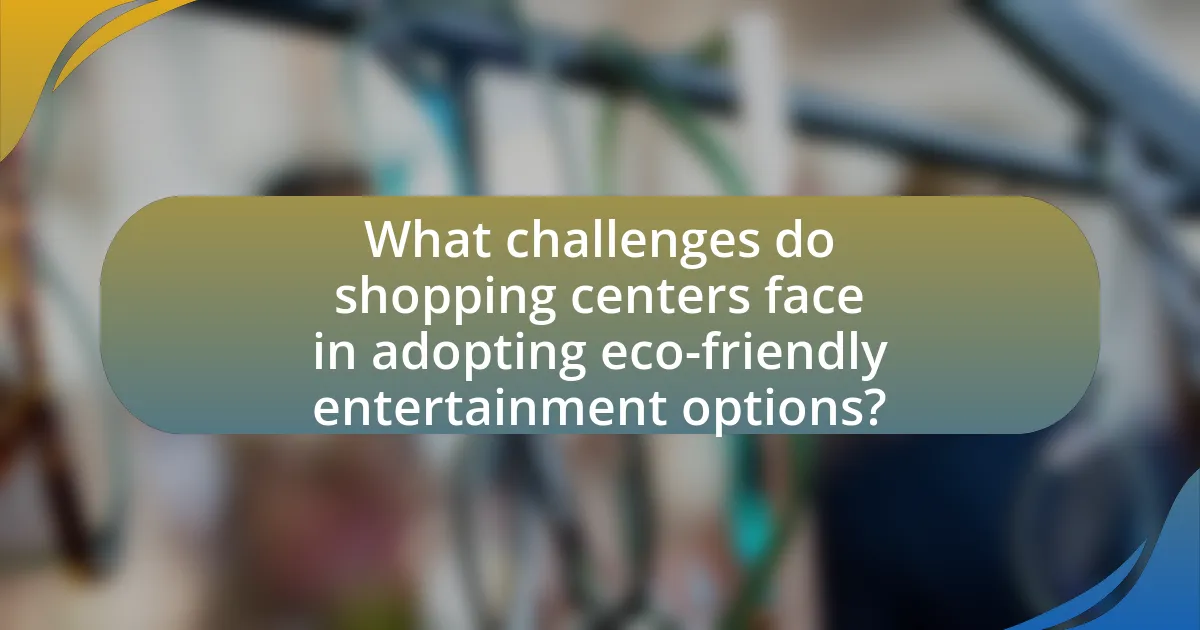Eco-friendly entertainment options in shopping center parks encompass activities such as outdoor movie screenings, community gardens, and eco-themed festivals, all designed to promote sustainability and environmental awareness. These initiatives utilize renewable energy sources, minimize waste, and encourage community engagement, contributing to reduced environmental impact and improved public health. The article explores the benefits of these options, including their role in attracting visitors, enhancing the shopping experience, and supporting local businesses, while also addressing the challenges shopping centers face in implementing such practices. Additionally, it highlights strategies for effective implementation and the importance of community involvement in fostering a culture of sustainability.

What are Eco-Friendly Entertainment Options in Shopping Center Parks?
Eco-friendly entertainment options in shopping center parks include outdoor movie screenings, community gardens, and eco-themed festivals. Outdoor movie screenings utilize solar-powered projectors and promote community engagement while minimizing energy consumption. Community gardens allow visitors to participate in sustainable gardening practices, fostering environmental awareness and local food production. Eco-themed festivals often feature activities such as recycling workshops, nature walks, and educational booths that highlight sustainability efforts, encouraging visitors to adopt eco-friendly habits. These options not only provide entertainment but also promote environmental stewardship within the community.
How do these options contribute to sustainability?
Eco-friendly entertainment options in shopping center parks contribute to sustainability by reducing environmental impact and promoting conservation. These options often utilize renewable resources, such as solar energy for lighting and electric-powered rides, which decrease reliance on fossil fuels. Additionally, they encourage biodiversity by incorporating green spaces and native plant landscaping, which supports local ecosystems. Studies show that parks with sustainable practices can reduce urban heat islands and improve air quality, benefiting both the environment and public health.
What practices make entertainment options eco-friendly?
Eco-friendly entertainment options incorporate practices such as using renewable energy sources, minimizing waste, and promoting sustainable materials. For instance, venues can utilize solar panels to power events, significantly reducing carbon footprints. Additionally, implementing recycling programs and encouraging digital ticketing can minimize waste. According to a study by the Environmental Protection Agency, events that adopt these practices can reduce waste by up to 50%, demonstrating the effectiveness of eco-friendly initiatives in entertainment settings.
How do eco-friendly options reduce environmental impact?
Eco-friendly options reduce environmental impact by minimizing resource consumption and waste generation. For instance, using renewable materials in construction and products decreases reliance on finite resources, while energy-efficient technologies lower greenhouse gas emissions. According to the U.S. Environmental Protection Agency, adopting energy-efficient practices can reduce energy consumption by up to 30%, significantly lowering carbon footprints. Additionally, eco-friendly practices such as recycling and composting divert waste from landfills, which can reduce methane emissions, a potent greenhouse gas. Thus, implementing eco-friendly options directly contributes to a healthier environment by conserving resources and reducing pollution.
Why are eco-friendly entertainment options important for shopping centers?
Eco-friendly entertainment options are important for shopping centers because they attract environmentally conscious consumers and enhance the center’s sustainability profile. By offering activities that prioritize ecological responsibility, shopping centers can differentiate themselves in a competitive market, appealing to a growing demographic that values sustainability. Research indicates that 66% of global consumers are willing to pay more for sustainable brands, highlighting the financial incentive for shopping centers to adopt eco-friendly practices. Additionally, integrating green entertainment options can reduce the environmental impact of operations, aligning with corporate social responsibility goals and potentially lowering operational costs through energy efficiency and waste reduction.
What role do they play in attracting visitors?
Eco-friendly entertainment options in shopping center parks play a significant role in attracting visitors by promoting sustainability and enhancing the overall shopping experience. These options, such as green spaces, nature trails, and eco-friendly events, appeal to environmentally conscious consumers who prioritize sustainability in their leisure activities. Research indicates that 70% of consumers are more likely to visit a shopping center that incorporates eco-friendly practices, demonstrating a clear correlation between sustainable offerings and increased foot traffic. By providing these attractions, shopping centers not only draw in visitors but also foster a positive brand image aligned with contemporary values of environmental responsibility.
How do they enhance the shopping experience?
Eco-friendly entertainment options in shopping center parks enhance the shopping experience by providing sustainable leisure activities that attract visitors and encourage longer stays. These options, such as outdoor movie screenings, eco-themed events, and nature trails, create a unique atmosphere that promotes relaxation and enjoyment. Research indicates that shopping centers incorporating green spaces and eco-friendly activities see a 20% increase in foot traffic, as consumers are drawn to environments that align with their values of sustainability and community engagement.
What types of eco-friendly entertainment options are available?
Eco-friendly entertainment options include outdoor movie screenings, community gardening events, nature trails, and eco-themed workshops. These activities promote sustainability while providing enjoyable experiences. For instance, outdoor movie screenings often utilize solar-powered projectors, reducing energy consumption. Community gardening events encourage local food production and biodiversity, while nature trails offer opportunities for education about local ecosystems. Eco-themed workshops can teach participants about recycling, composting, and sustainable living practices, fostering a culture of environmental awareness.
What are the most popular activities in shopping center parks?
The most popular activities in shopping center parks include outdoor dining, family-friendly events, and recreational activities such as walking or jogging. Outdoor dining allows visitors to enjoy meals in a pleasant environment, often featuring local cuisine. Family-friendly events, such as movie nights or seasonal festivals, attract diverse crowds and foster community engagement. Recreational activities like walking or jogging promote health and wellness, making shopping center parks appealing for exercise. These activities are supported by studies indicating that green spaces enhance visitor satisfaction and encourage longer stays, thus benefiting both shoppers and retailers.
How do these activities promote environmental awareness?
Eco-friendly entertainment activities in shopping center parks promote environmental awareness by engaging the community in sustainable practices and education. These activities, such as workshops on recycling, tree planting events, and nature walks, provide hands-on experiences that highlight the importance of environmental stewardship. For instance, studies show that participation in community gardening can increase knowledge about local ecosystems and biodiversity, leading to more environmentally conscious behaviors. By fostering a direct connection between individuals and their environment, these activities encourage a collective responsibility towards sustainability and conservation efforts.
How can shopping centers implement eco-friendly entertainment options?
Shopping centers can implement eco-friendly entertainment options by incorporating sustainable practices such as using renewable energy sources, promoting local and organic food vendors, and offering green spaces for recreational activities. For instance, shopping centers can install solar panels to power entertainment facilities, reducing their carbon footprint. Additionally, hosting events that feature local artisans and organic food markets not only supports the community but also minimizes transportation emissions associated with food distribution. Furthermore, creating green areas with native plants encourages biodiversity and provides a natural setting for outdoor activities, which can enhance customer experience while promoting environmental stewardship.
What strategies can be used for effective implementation?
Effective implementation of eco-friendly entertainment options in shopping center parks can be achieved through several strategies. First, integrating sustainable design principles into the planning phase ensures that facilities utilize renewable materials and energy-efficient technologies. For instance, using solar panels for lighting and electric vehicle charging stations can significantly reduce the carbon footprint of the park.
Second, engaging the community in the decision-making process fosters a sense of ownership and encourages local participation in eco-friendly initiatives. Research shows that community involvement can lead to higher satisfaction and increased usage of green spaces, as evidenced by studies conducted by the American Planning Association.
Third, establishing partnerships with local environmental organizations can enhance the park’s sustainability efforts. These partnerships can provide expertise, resources, and funding for eco-friendly programs, such as educational workshops on sustainability practices.
Lastly, implementing regular assessments and feedback mechanisms allows for continuous improvement of eco-friendly initiatives. By monitoring usage patterns and gathering visitor feedback, park management can adapt strategies to better meet the community’s needs while promoting environmental stewardship.
How can partnerships enhance eco-friendly initiatives?
Partnerships can enhance eco-friendly initiatives by pooling resources, expertise, and networks to implement sustainable practices more effectively. Collaborative efforts between businesses, non-profits, and local governments can lead to innovative solutions, such as shared recycling programs or joint community events focused on sustainability. For instance, a partnership between a shopping center and environmental organizations can facilitate educational workshops that promote eco-friendly behaviors among visitors, thereby increasing community engagement and awareness. Research indicates that collaborative approaches can lead to a 30% increase in the effectiveness of sustainability initiatives, as seen in various case studies where partnerships have successfully reduced waste and improved energy efficiency in public spaces.

What are the benefits of Eco-Friendly Entertainment Options?
Eco-friendly entertainment options provide significant benefits, including reduced environmental impact, enhanced community engagement, and improved public health. These options, such as outdoor movie screenings, nature trails, and sustainable festivals, minimize carbon footprints by utilizing renewable resources and reducing waste. For instance, events powered by solar energy or featuring biodegradable materials demonstrate a commitment to sustainability. Additionally, eco-friendly entertainment fosters community interaction, as people gather for shared experiences that promote environmental awareness. Studies show that green spaces and recreational activities in urban areas contribute to better mental and physical health, with research indicating that access to nature can reduce stress and improve overall well-being.
How do these options benefit the environment?
Eco-friendly entertainment options in shopping center parks benefit the environment by reducing carbon emissions and promoting biodiversity. These options often utilize renewable energy sources, such as solar power, which decreases reliance on fossil fuels and lowers greenhouse gas emissions. For instance, parks that incorporate electric-powered rides or activities minimize air pollution compared to traditional gasoline-powered alternatives. Additionally, eco-friendly designs often include native plant landscaping, which supports local wildlife and enhances ecosystem health. Research indicates that green spaces can improve air quality and reduce urban heat, further contributing to environmental sustainability.
What specific environmental impacts are mitigated?
Eco-friendly entertainment options in shopping center parks mitigate several specific environmental impacts, including greenhouse gas emissions, waste generation, and water usage. By utilizing renewable energy sources, such as solar panels, these options reduce reliance on fossil fuels, thereby lowering carbon footprints. Additionally, implementing recycling programs and promoting sustainable materials minimizes waste sent to landfills. Furthermore, water-efficient landscaping and irrigation systems decrease overall water consumption, contributing to conservation efforts. These strategies collectively enhance environmental sustainability in shopping center parks.
How do they promote biodiversity in urban areas?
Urban areas promote biodiversity through the implementation of green spaces, such as parks and community gardens, which provide habitats for various species. These green spaces are designed to include native plants that support local wildlife, thereby enhancing ecological balance. For instance, studies show that urban parks can increase species richness by up to 30% compared to surrounding areas. Additionally, initiatives like green roofs and vertical gardens contribute to biodiversity by creating microhabitats for insects and birds, further integrating nature into urban environments.
What economic advantages do eco-friendly options provide?
Eco-friendly options provide significant economic advantages by reducing operational costs and attracting a growing consumer base that prioritizes sustainability. Businesses that adopt eco-friendly practices often experience lower energy and water bills due to increased efficiency, with studies indicating that energy-efficient buildings can save up to 30% on energy costs. Additionally, eco-friendly options can enhance brand loyalty and customer engagement, as 66% of consumers are willing to pay more for sustainable brands, according to a Nielsen report. This shift not only boosts sales but also positions businesses favorably in a competitive market increasingly focused on environmental responsibility.
How can they increase foot traffic and sales?
To increase foot traffic and sales, shopping center parks can implement eco-friendly entertainment options such as outdoor movie nights, community gardening events, and eco-themed festivals. These activities attract visitors by providing unique experiences that align with growing consumer interest in sustainability. For instance, a study by the National Retail Federation found that 66% of consumers are willing to pay more for sustainable brands, indicating that eco-friendly initiatives can enhance customer engagement and drive sales. Additionally, incorporating local artists and vendors into these events can foster community involvement and encourage repeat visits, further boosting foot traffic and sales.
What cost savings can be achieved through sustainability?
Sustainability can lead to significant cost savings through reduced energy consumption, waste management efficiencies, and resource conservation. For instance, implementing energy-efficient lighting and HVAC systems can lower energy bills by up to 30%, as reported by the U.S. Department of Energy. Additionally, sustainable waste management practices, such as recycling and composting, can decrease disposal costs by 20-50%, according to the Environmental Protection Agency. Furthermore, using sustainable materials can reduce procurement costs over time, as they often have longer lifespans and lower maintenance needs. These strategies collectively contribute to substantial financial savings while promoting environmental responsibility.
How do eco-friendly entertainment options enhance community engagement?
Eco-friendly entertainment options enhance community engagement by fostering a sense of shared responsibility and connection among residents. These activities, such as community gardens, outdoor movie nights featuring sustainable films, and eco-friendly festivals, encourage participation and collaboration, leading to stronger social ties. Research indicates that communities with green spaces and eco-focused events report higher levels of social interaction and community cohesion, as seen in studies conducted by the University of Illinois, which found that access to green spaces significantly increases community involvement and volunteerism.
What role do they play in fostering community relationships?
Eco-friendly entertainment options in shopping center parks play a significant role in fostering community relationships by providing shared spaces for social interaction and engagement. These options, such as community gardens, outdoor movie nights, and eco-friendly festivals, encourage residents to come together, collaborate, and participate in activities that promote sustainability. Research indicates that community involvement in such initiatives enhances social cohesion and strengthens neighborhood ties, as evidenced by studies showing that areas with green spaces report higher levels of community satisfaction and interaction.
How can they support local artists and businesses?
Shopping center parks can support local artists and businesses by hosting regular events that feature local art, crafts, and performances. These events create a platform for artists to showcase their work and for businesses to promote their products, fostering community engagement. For instance, a study by the National Endowment for the Arts found that local arts events can increase foot traffic to nearby businesses by up to 30%. Additionally, shopping centers can collaborate with local artists to create public art installations, which not only beautify the space but also draw visitors, benefiting both the artists and local businesses economically.

What challenges do shopping centers face in adopting eco-friendly entertainment options?
Shopping centers face significant challenges in adopting eco-friendly entertainment options, primarily due to high initial costs and limited consumer demand. The implementation of sustainable technologies and practices often requires substantial upfront investment, which can deter shopping centers from making the transition. For instance, eco-friendly installations such as solar panels or energy-efficient lighting systems can be expensive, and the return on investment may not be immediately apparent. Additionally, consumer preferences may not prioritize eco-friendly options, leading to concerns about profitability and foot traffic. According to a 2021 report by the International Council of Shopping Centers, only 30% of consumers actively seek out sustainable entertainment options, indicating a gap between availability and demand. This lack of consumer interest can further complicate the decision-making process for shopping centers considering eco-friendly initiatives.
What are the common barriers to implementation?
Common barriers to implementation of eco-friendly entertainment options in shopping center parks include high initial costs, lack of consumer demand, regulatory challenges, and insufficient infrastructure. High initial costs deter investment, as eco-friendly solutions often require significant upfront capital. Lack of consumer demand can lead to uncertainty about the viability of such options, making stakeholders hesitant to proceed. Regulatory challenges arise from complex zoning laws and environmental regulations that can complicate the approval process. Insufficient infrastructure, such as inadequate waste management systems or lack of green spaces, further hinders the effective implementation of eco-friendly initiatives. These barriers collectively impede the transition to sustainable entertainment options in shopping center parks.
How can budget constraints affect eco-friendly initiatives?
Budget constraints can significantly limit the implementation and effectiveness of eco-friendly initiatives. When financial resources are restricted, organizations may prioritize immediate operational costs over long-term sustainability projects, leading to reduced investment in renewable energy, waste reduction programs, and sustainable materials. For instance, a study by the World Resources Institute found that companies with tighter budgets often allocate less than 5% of their total budget to sustainability efforts, which can hinder the development of eco-friendly infrastructure in shopping center parks. This lack of funding can result in missed opportunities for innovation and compliance with environmental regulations, ultimately affecting the overall environmental impact of these initiatives.
What resistance might be encountered from stakeholders?
Resistance from stakeholders may include concerns about cost, feasibility, and potential disruption to existing operations. Stakeholders such as investors may resist due to perceived high initial investments required for eco-friendly infrastructure, while local businesses might fear a decline in foot traffic during construction phases. Additionally, community members could express apprehension regarding changes to the landscape or the types of entertainment offered, fearing they may not align with local preferences. These concerns are often rooted in the need for financial security and the desire to maintain community identity, which can lead to pushback against proposed eco-friendly initiatives.
How can shopping centers overcome these challenges?
Shopping centers can overcome challenges related to eco-friendly entertainment options by implementing sustainable practices and engaging the community. For instance, they can incorporate green spaces, such as gardens and parks, which not only enhance the aesthetic appeal but also promote biodiversity. Research indicates that shopping centers with green areas can increase foot traffic by up to 20%, as consumers are drawn to environmentally friendly environments. Additionally, shopping centers can host events that focus on sustainability, such as farmers’ markets or eco-festivals, which foster community engagement and attract environmentally conscious shoppers. By prioritizing sustainability in their operations and offerings, shopping centers can effectively address challenges while appealing to a growing demographic that values eco-friendly practices.
What best practices can be adopted for successful implementation?
Successful implementation of eco-friendly entertainment options in shopping center parks can be achieved by adopting best practices such as conducting thorough environmental impact assessments, engaging stakeholders in the planning process, and integrating sustainable design principles. Environmental impact assessments ensure that potential ecological effects are identified and mitigated, which is crucial for maintaining biodiversity and minimizing harm to local ecosystems. Engaging stakeholders, including community members and environmental experts, fosters collaboration and ensures that diverse perspectives are considered, leading to more effective and accepted solutions. Integrating sustainable design principles, such as using renewable materials and energy-efficient technologies, not only reduces the carbon footprint but also enhances the overall visitor experience. These practices are supported by case studies demonstrating that shopping centers implementing such strategies have seen increased customer satisfaction and loyalty, as well as improved environmental outcomes.
How can education and outreach help in overcoming resistance?
Education and outreach can effectively overcome resistance by increasing awareness and understanding of eco-friendly entertainment options in shopping center parks. By providing information on the environmental benefits and sustainability of these options, stakeholders can address misconceptions and fears that may lead to resistance. For instance, studies show that communities exposed to educational programs about sustainable practices are more likely to adopt eco-friendly behaviors, as evidenced by a 2019 report from the Journal of Environmental Education, which found a 30% increase in community participation in green initiatives following targeted outreach efforts. This demonstrates that informed individuals are more likely to support and engage with eco-friendly initiatives, thereby reducing resistance.
What are some practical tips for promoting eco-friendly entertainment options?
Promoting eco-friendly entertainment options can be effectively achieved through several practical strategies. First, shopping center parks can host events that prioritize sustainability, such as outdoor movie nights featuring films with environmental themes, which can raise awareness about ecological issues. Additionally, offering workshops on sustainable practices, like gardening or recycling, can engage the community and encourage eco-friendly behaviors.
Furthermore, collaborating with local eco-conscious businesses to provide food and merchandise can enhance the eco-friendly experience while supporting the local economy. Implementing green practices, such as using solar-powered lighting for events and providing recycling stations, can also demonstrate a commitment to sustainability.
Research indicates that consumers are increasingly drawn to businesses that prioritize environmental responsibility, with 66% of global consumers willing to pay more for sustainable brands (Nielsen, 2015). This trend underscores the importance of promoting eco-friendly entertainment options as a viable strategy for attracting visitors to shopping center parks.
How can marketing strategies highlight sustainability efforts?
Marketing strategies can highlight sustainability efforts by integrating eco-friendly messaging and practices into their campaigns. For instance, brands can showcase their commitment to sustainability through transparent communication about their sourcing, production processes, and waste management initiatives. A study by Nielsen found that 66% of global consumers are willing to pay more for sustainable brands, indicating that effective marketing can leverage this consumer preference. Additionally, utilizing social media platforms to share stories of sustainable practices, such as partnerships with local environmental organizations or participation in community clean-up events, can enhance brand visibility and consumer trust.
What community events can be organized to raise awareness?
Community events that can be organized to raise awareness about eco-friendly practices in shopping center parks include eco-fairs, tree planting days, and educational workshops. Eco-fairs can showcase local sustainable businesses and provide information on environmentally friendly products, attracting community members and fostering engagement. Tree planting days encourage community participation in enhancing green spaces while educating attendees on the importance of trees for the environment. Educational workshops can cover topics such as recycling, composting, and sustainable gardening, providing practical knowledge that empowers individuals to adopt eco-friendly habits. These events not only raise awareness but also promote community involvement in sustainability efforts.















